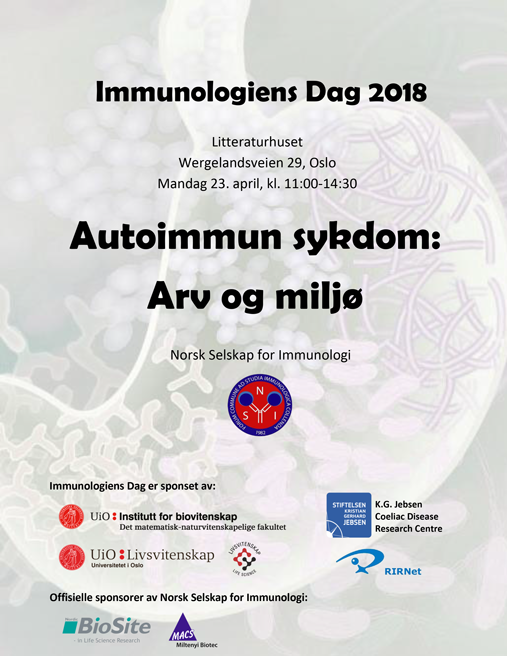Tidligere arrangementer - Side 80
Ankur Garg, PhD, will give a talk titled, "Structural and functional analysis of ribonuclease ZC3H12C mediated regulation of immune responses"
Anders Kvellestad, Department Physics, UiO
Kostiantyn Ralchenko (Taras Shevchenko National University of Kyiv) gives a lecture with the title: Maximum likelihood estimation for drift parameter of Gaussian process.
Yuliia Mishura (Taras Shevchenko National University of Kyiv) gives a lecture with the title: Fractional Cox-Ingersoll-Ross process and its applications to financial markets.
Andrius Popovas, ITA
Marieke Kuijjer, of Dana-Farber Cancer Institute and Harvard T.H. School of Public Health, will give a talk titled: "Understanding cancer using integrative network models"
On Friday, instead of the ordinary institute seminar, we'll have Friday mingle in the lobby. We will celebrate some of the Institute's history and past research leaders with an extra good birthday cake, so please come! It will be time to chat and hear what people are doing. Friday at 11.00 in the lobby.
Kurusch Ebrahimi-Fard (NTNU) will give a talk with title: Moment-cumulant relations in noncommutative probability and shuffle-exponentials
Abstract: In this talk we consider monotone, free, and boolean moment-cumulant relations from the shuffle algebra viewpoint. Cumulants are described as infinitesimal characters over a particular combinatorial Hopf algebra, which is neither commutative nor cocommutative. As a result the moment-cumulant relations can be encoded in terms of shuffle and half-shuffle exponentials. These shuffle exponentials and the corresponding logarithms permit to express monotone, free, and boolean cumulants in terms of each other using the pre-Lie Magnus expansion. If time permits we will revisit additive convolution in monotone, free and boolean probability and related aspects. Based on joint work with F. Patras (CNRS).
In this second talk I will prove the local slice theorem and give examples of applications, discuss compactness properties of instanton moduli spaces, and explain the definition and some properties of instanton homology.
In their book "Riemann-Roch Algebra", Fulton and Lang give an account of Chern classes in lambda-rings and a general version of Grothendieck's Riemann-Roch theorem. Their definition of Chern classes is based on the additive formal group law. In work on connective K-theory, Greenlees and I have given an account of Chern classes in lambda-rings based on the multiplicative formal group law. This account has an evident generalization to any formal group law. The course will be an attempt to carry out Fulton and Lang's program in this more general setting. Hoped for applications include generalizations of results relating rational lambda-modules to twisted Dirichlet characters. ---
The third Scandinavian Gathering Around Remarkable Discrete Mathematics
Pr?veforelesning for professorstilling i TEM: The microscopic and macroscopic models of an ideal gas
Beatríz Villarroel, Uppsala University
Speakers: E?rs Szathmáry, Ferenc Jordan, and András Báldi. [Update: Gabor Foldvari's talk on "Urban ecology of tick-borne diseases: how to anticipate?" has been moved to Wednesday 25 April.]
CAN A HUMAN RIGHTS BASED APPROACH ACCELERATE REDUCTION OF UNDERNUTRITION AND OBESITY?
The seminar is open to everybody and free of charge, but registration was required for lunch order. Registration is now closed, but you are welcome to join the seminar without lunch.
By Gabor Foldvari, Department of Parasitology and Zoology, University of Veterinary Medicine, Budapest
?rets tema er "Autoimmun sykdom: Arv og milj?"
By Dr. Han Wang, Northwest Agriculture and Forestry University, Yangling and Tsinghua University, Beijing, China.
Jayant Joshi, Postdoc at Institute of Theoretical Astrophysics, UiO.
Jim T?rresen and Charles Martin (RITMO/IFI) will present on the topic "Time series analysis and prediction with sequence learning and recurrent neural networks (RNN)".
Welcome to the next Oslo University Hospital (OUH) research seminar entitled "Precision medicine in complex diseases". The seminar is open to all.
Waldhausen's algebraic K-theory of spaces is an extension of algebraic K-theory from rings to spaces (or ring spectra) which also encodes important geometric information about manifolds. Bivariant A-theory is a bivariant extension of algebraic K-theory from spaces to fibrations of spaces. In this talk, I will first recall the definition and basic properties of bivariant A-theory and the A-theory Euler characteristic of Dwyer-Weiss-Williams. I will then introduce a bivariant version of the cobordism category and explain how this may be regarded as a universal space for the definition of additive characteristic classes of smooth bundles. Lastly, I will introduce a bivariant extension of the Dwyer-Weiss-Williams characteristic and discuss the Dwyer-Weiss-Williams smooth index theorem in this context. Time permitting, I will also discuss some ongoing related work on the cobordism category of h-cobordisms. This is joint work with W. Steimle.



